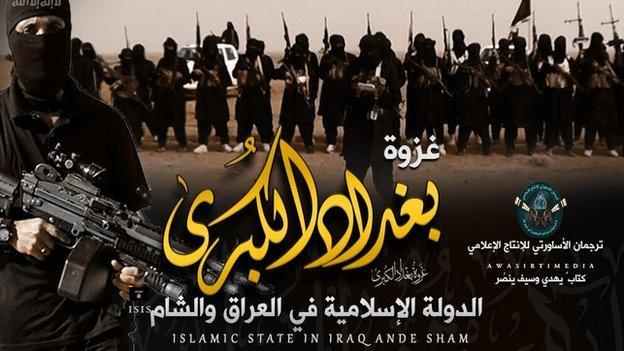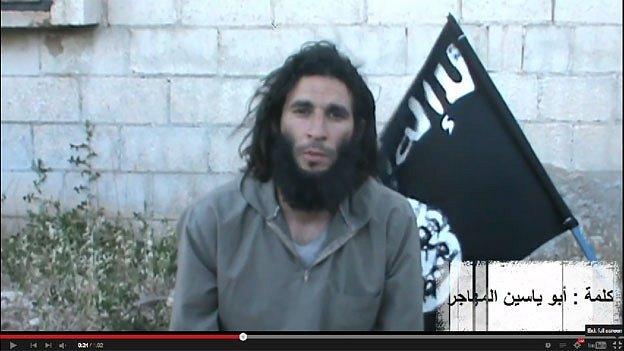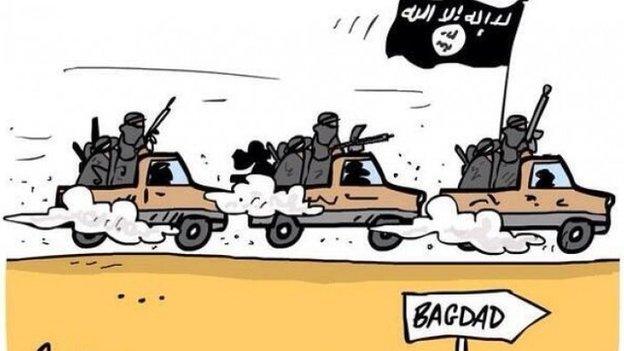How Isis is spreading its message online
- Published

"Baghdad's big battle" - an image posted on a pro-Isis Twitter account
Alongside the Islamic State in Iraq and the Levant's (Isis) battlefield successes in northern Iraq, the group has deployed a sophisticated social media strategy that is redefining its propaganda.
Since the offensive began on 9 June, a string of Twitter accounts claiming to represent Isis in Iraq and Syria have been active in providing live updates on the group's operations and images illustrating their advances.
Although the accounts have not been officially endorsed by Isis, they have been widely promoted as official regional Isis accounts by the group's many online supporters.
Isis has launched a social media campaign and is posting (mainly on Twitter) photos and statements to highlight its military strength and territorial advances in Iraq.
On 15 June, it posted images of what appears to be dozens of captured Iraqi security personnel along with threats and messages to surrounding towns warning residents of the group's approach. The photos included the apparent capture, transport, and ultimate killing of the soldiers.
The material went viral on the internet and was widely shared by Isis supporters.
Global campaign
According to a web-based data mining software, a large number of pro-Isis tweets originated in Saudi Arabia, Kuwait and other Gulf countries.
In its Twitter feed, Isis gives extensive details of its operations, including the number of bombings, suicide missions and assassinations it has carried out, and of checkpoints and towns it controls.
The top Twitter hashtags used by the group include: "#Baghdad_is_liberated" and "#Iraq_is_ liberated".

Screenshot from an Isis video posted on YouTube on 17 June, calling for support for the group
In addition to the hashtags, the group produces professional promotional videos and urges support for its "one billion campaign", which calls on Muslims to post messages, photos and videos on Twitter, Instagram and YouTube in support of Isis.
One video, posted on 17 June, shows an Isis member speaking in French and asking Muslims to support Isis's cause online. Many videos are also posted with English subtitles or translation.
Isis is launching a global online campaign on 20 June to support the group's operations in Iraq and Syria. The group is initiating a Twitter hashtag in Arabic which translates to #theFridayofsupportingISIS, asking supporters around the world to wave the Isis flag in public, film themselves and upload the clips on social media platforms.
In April 2014, the group developed a free internet application called The Dawn of Glad Tidings, which automatically posts tweets - approved by Isis media managers - to the accounts of the application's subscribed users.
The posts include hashtags, links, images, videos and other content. Almost 40,000 tweets were posted in a single day during the recent clashes in Iraq.
One post which went viral was of an image of an armed jihadist gazing at the Isis flag flying over Mosul with the inscription in Arabic: "We are coming, Baghdad."
The application is promoted by some of the organisation's leading figures.
Spreading fear
Isis is following a well-planned strategy and the group is selective with what is posted.

This cartoon was posted on the @ISIS_Media_Hub Twitter account
It chooses photos that have the potential of having a strong impact, presumably to create fear among its enemies and win the admiration of other radical groups.
Unlike other jihadist groups, such as the al-Qaeda affiliate in Syria the Nusra Front, Isis gives little consideration to the way it is perceived by the general public.
It rarely posts photos about its charity work or the services it provides in the towns it controls.
The Nusra Front, on the other hand, regularly posts statements and videos, showing the group's social services, including the distribution of food to the poor and traffic management.
The Nusra Front's approach has helped the group gain support at the grassroots level in Syria.
Blocked
In an attempt to limit the impact of Isis's social media campaign, the Iraqi government has blocked Facebook, Twitter and other platforms.
Users in the country attempting to visit these sites are greeted by a message saying that the Ministry of Communications has barred access.
Isis supporters strongly protested against the closure of social media platforms, blaming Twitter's administrators for the unprecedented attack on the group's presence on the micro-blogging site.
This is not the first time that Twitter has taken such a step. In February 2014, Twitter suspended the account of an Isis member who tweeted images of an amputation.
However, blocking Isis's access to social media sites may not have a significant impact on the group's publicity activities.
This is because it attracts followers from across the Arab and Muslim worlds, so countermeasures taken in Iraq may not have only a limited effect.
It is important to highlight that the group's online presence does not necessarily equate to its popularity.
The fact that Isis is using internet and social media applications to promote its message may indicate that it does not have strong organic support.
Regardless of this, the way Isis is running its social media campaign could be a sign of a shift in approach from being an insular group to actively reaching out to the world.
BBC Monitoring, external reports and analyses news from TV, radio, web and print media around the world. For more reports from BBC Monitoring, click here. You can follow BBC Monitoring on Twitter , externaland Facebook, external.